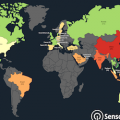PTE考生目前最大的问题之一就是练习题缺乏。除了有限的基本官方书(PLUS,Testbuilder, OG)之外,就没有题了。很多英语基础不是很扎实的同学很难找到练习材料。墨尔本文波雅思PTE培训学校专门为墨尔本,悉尼PTE考生准备了适合PTE听力阅读练习的科学60秒。各位PTE同学可以练习PTE听力中的summarise spoken text和PTE口语中的retell lecture,PTE听力口语-科学60秒-Frosty Moss练习记笔记技巧和复述。废话少说,下面开始:
Facebook Plans Remote Coverage via Drones
听力内容:
60秒科学节目(SSS)是科学美国人网站的一套广播栏目,英文名称:Scientific American – 60 Second Science,节目内容以科学报道为主,节目仅一分钟的时间,主要对当今的科学技术新发展作以简明、通俗的介绍,对于科学的发展如何影响人们的生活环境、健康状况及科学技术,提供了大量简明易懂的阐释。
Two out of three people in the world cannot connect to the Internet. Not because of crummy service, but rather because in the remote areas where they live there is no service.
To come up with ways to deliver data services to underserved areas Facebook, Qualcomm and others formed Internet.org.
Facebook’s big idea is to launch solar-powered atmospheric satellite drones that can carry equipment for relaying wireless networks. To get the hardware, the social network is buying atmosat-maker Titan Aerospace for $60 million.
Rather than just buying a fleet of Titan’s Solara drones, Facebook is trying to accelerate their development. Titan has said its atmosats wouldn’t be ready for customers until next year.
But building an autonomous aircraft that can stay aloft for years at a time isn’t easy. Just ask the U.S. Defense Department and Boeing. They spent about five years and tens of millions of dollars trying to get their high-flying, solar-powered Vulture aircraft off the ground. But in 2012 DARPA decided to instead focus on further developing only the photovoltaic and energy storage systems meant for the Vulture.
That said, being °∞liked°± by Facebook should help the Solara drones soar.
–Larry Greenemeier





